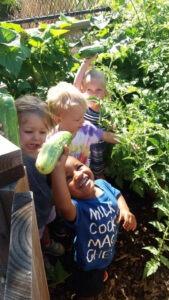
How can gardening help your child to learn, grow, and develop? The Montessori educational experience doesn’t stop at the classroom door. Whether your child attends a full-year program or is preparing to start a summer camp, take a look at what you need to know about gardening in Montessori schools and the role it has in childhood development.
Why Use Gardening In A Montessori School?
To answer this question, you may need to learn more about Montessori basics. The educational philosophy, created by Dr. Maria Montessori, over a century ago, gives students the chance to self-motivate, guide their own learning process, make connections, become part of a caring and supportive community, and explore through their senses.
Unlike the traditional preschool, school, or even summer camp learning classroom, Montessori classrooms often put a heavier emphasis on the natural world. This includes interacting with nature—both inside and outside of the school building. Along with free child-guided outdoor and nature-based explorations, Montessori schools and summer camps may also use gardening activities to help children to make their own discoveries, learn, and grow as members of the community.
What Are the Benefits of Gardening In Montessori Programs?
Time spent in nature can greatly benefit children in Montessori programs and other educational environments. If your child’s Montessori preschool, kindergarten, or summer camp offers a gardening component, the benefits of these activities may include:
- Motor skill building. From using gardening tools to digging in the dirt, gardening activities can help young children to build fine motor skills (such as hand-eye coordination, dexterity, and hand/finger strength) and gross motor skills (such as balance).
- Sensory development. The sweet smells, bold colors, and diverse textures of a growing garden can help children to develop senses such as smell, sight, and touch.
- Early literacy skill-building. Whether the class reads stories in the garden, journal about the nature experience, learn new gardening-based vocabulary, or engage in another activity, gardening can improve literacy skills.
- Cognitive development. The steps necessary to plant and care for vegetables, flowers, and other greenery require complex critical thinking, problem-solving, memory and recollection, and other similar cognitive skills.
- Social development. Each child will do more than work independently in the garden. A class or school garden is a community experience that can help young students to build social abilities, such as sharing, caring for one another, and communicating.
- Attention and focus. A class gardening activity can help children to focus when they leave the indoor classroom and go outdoors into nature. The change of scenery can refresh and recharge their minds, which can help them to pay better attention.
- Stress reduction. Time spent outdoors in green spaces can reduce stress. This can help young students to relax, reset, and gain a peaceful sense of calm.
- Engagement in learning. The outdoor classroom or class gardening experience can grab the student’s attention and engage them in the learning process—especially if the child shows an existing interest in this activity.
- Encourage creativity. The outdoor setting can encourage the child’s natural sense of creativity and provide a way for them to express themselves.
Along with these benefits, gardening in the Montessori program provides a practical way for children to learn where their food comes from. Instead of buying produce from a store, the children can grow their own vegetables and may even prepare them for a class meal.
How Can You Prepare Your Child for a School or Camp Gardening Experience?
Start with your child’s teacher. Ask the educator what your child should wear or if they need to bring anything with them (such as gardening gloves or tools). Many schools will provide the appropriate equipment necessary for the children to garden. If your child has a specific interest, talk to the teacher about encouraging your child to explore these aspects of gardening.
Do you want to learn more about how nature plays a role in Montessori education and summer programs? Contact Miniapple International Montessori School for more information.

